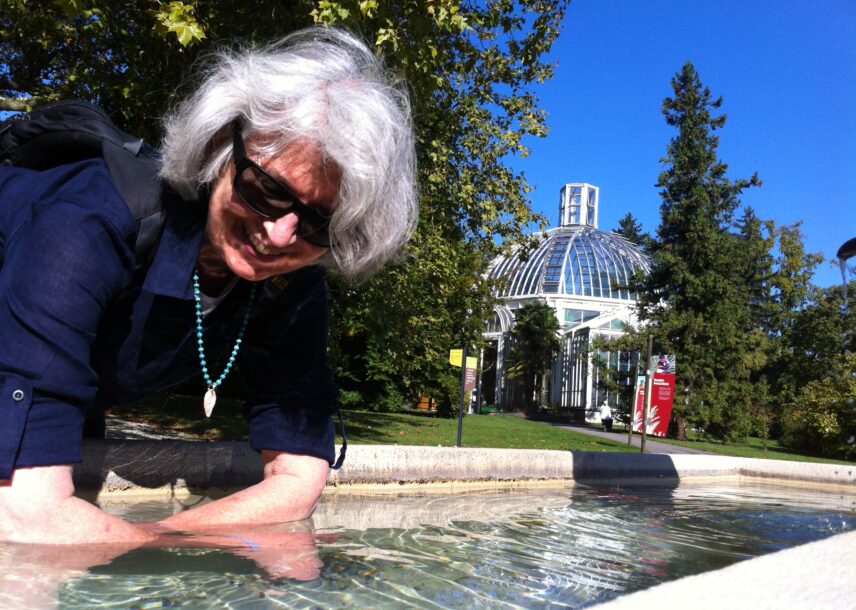You must meet Sandy.
 That’s what everyone was saying to me. I’d arrived at the Oxford Union for the Reception to celebrate the 30th Anniversary of the Prison Phoenix Trust. I was overwhelmed by the number of people present, the atmosphere of warmth and sincerity, the significance of the event itself. And this woman in the simple yet gorgeous deep blue velvet jacket was the person I needed to meet.
That’s what everyone was saying to me. I’d arrived at the Oxford Union for the Reception to celebrate the 30th Anniversary of the Prison Phoenix Trust. I was overwhelmed by the number of people present, the atmosphere of warmth and sincerity, the significance of the event itself. And this woman in the simple yet gorgeous deep blue velvet jacket was the person I needed to meet.
They were right. I only managed to speak to Sandy Chubb for a few minutes because an event such as this is not the place for a full length interview. But Sandy left an impression. I came away convinced that I needed to know more about this remarkable woman and so I was delighted when Sandy agreed to answer a few questions about her journey with yoga and meditation.
So let me introduce Sandy to you, if you haven’t met her already. She teaches regularly at the Oxford Zen Centre , if you’d like to experience Sanbo Zen meditation for yourself.
How has yoga played a part in your life and what does yoga mean for you?
When I was 20, there was an ad for a yoga talk outside a hall in Westminster, which I wandered into to find an elderly Indian yogi saying, “Yoga isn’t common sense, it’s good sense!” Shortly after, I was attending two Iyengar classes a week in London, loving the joy of flexible youth. A flexible body leads to a flexible mind – great benevolence. Yoga allows you respect and confidence in your body, and meditation allows you to see the good fortune showering its treasure in the world every moment.
How and when did you first become involved with the Prison Phoenix Trust?
In 1987 Ann Wetherall, the founder of The Prison Ashram Project, and I sat in the same meditation group. She explained her vision for the Project which started in 1988. She was an irresistible force, so a year later, I was in Grendon Prison and in HMYOI Aylesbury offering yoga and she asked me to join her full-time in the Charity.
From your own work with prisoners and your role as Director of The Prison Phoenix Trust, what have you observed is the importance and effectiveness of yoga for prisoners?
With the body, breath and mind, you start on a level playing field. We all relate to the things we share, but many men and women inside have lost confidence in their bodies and minds through years of damage. Yoga and meditation not only brings them relief surprisingly quickly, but over time, their confidence in themselves increases, because they begin to see they are part of a whole universe full of compassion. When they learn to trust this compassion and flawless “self”, they stop trying to control everything and each day gets a little easier.
Prisoners love meditation and my gratitude for the things they have taught me over the years is boundless.
What led you to become an Assistant Zen Teacher with Sanbo Zen school of Meditation, Kamakura, Japan in 2010 and what does it take to become an Authentic Sanbo-Zen Teacher?
I started Zen practice in the eighties, and with Sanbo Zen, as it is now called, in 1993. Sanbo Zen uses koan study to help students deepen their practice and after an initial tiny “glimpse” of the essential self, practitioners study books of koans – about 500 koans in all – with their teacher. When I finished koan study, I was invited to attend the international senior student/zen teacher annual study week called Kenshukai. In 2010, the Abbot of Sanbo Zen Ryoun Roshi authorised me to become an Assistant Zen Teacher – a great shock and surprise at the time. When the shock passed, the privilege of such an opportunity to help others was clear. It meant that practice and experience had to deepen considerably more for me to feel best able to help others but in 2013, when I became a Zen Teacher, I received the Abbot’s authorisation and invitation with joy and gratitude.
 What would you describe as the power of meditation and why is it still important in the modern world?
What would you describe as the power of meditation and why is it still important in the modern world?
The modern world is full of pressure to do better. People are bombarded with distractions like telephones, social media, emails, information, and television. Many walk along unable to hear birdsong or the natural noise of the environment, because of earphones isolating them. And there is much trouble in the world. Meditation In Silence is a modern opportunity to cope with distraction, addictions and suffering, in that it introduces you to who you truly are, and when people see how they limit themselves, they find that they want to explore that.
When yoga and meditation are practised in true compassion, can they change the world?
When yoga and meditation are practised with emphasis on the breath and silence within the breath, the compassion we live in all the time unfolds.
One person can change the world, because fundamentally, we are not separate.
People often talk about oneness but it takes decades to truly live and experience. Then you see that all things are serving each other, and we are part of a sacred activity.
In what ways are you still seeing lives changed by yoga and meditation today?
As the small self becomes less needy and dominant, practitioners cannot avoid helping others often in the least noticeable ways. It makes all us happier.


